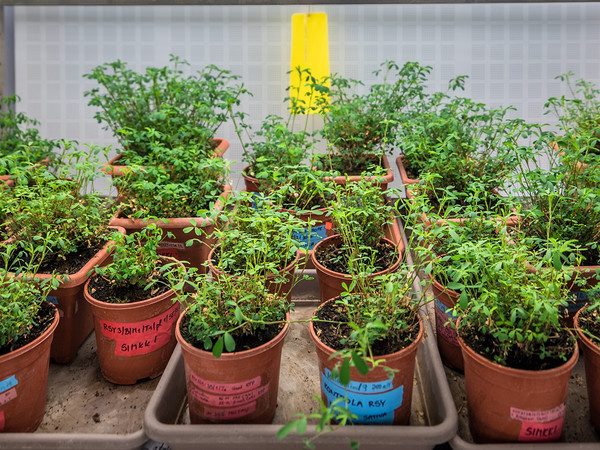A new research project of the Department of Biotechnology at the Faculty of Science Palacký University Olomouc is aimed at increasing the resistance of alfalfa to cold, drought and soil salinity, in which scientists will use the latest findings in the field of genetic engineering. The Olomouc experts will cooperate with the group of Professor Tibor Pechan, who works at Mississippi State University in the USA. The project "Experimental use of mitogen-activated protein kinases and modern interdisciplinary approaches for the prospective improvement of alfalfa resistance to cold, drought and salinity" will last 46 months. The work of the scientists was financially supported by the Ministry of Education, Youth and Sports with an amount of almost 7.5 million CZK.
Alfalfa is one of the most important legumes in the world, and farmers grow it on more than 34 million hectares. Alfalfa prevents soil erosion, improves its fertility and structure, and helps reduce contamination of surface and groundwater. At the same time, it provides fodder and high-quality proteins and nutritional supplements for human nutrition, as it contains valuable antioxidants, minerals, enzymes, and vitamins. In addition, thanks to its symbiosis with soil bacteria of the genus Sinorhizobium, alfalfa can fix large amounts of atmospheric nitrogen. Alfalfa thus enriches the soil with this important chemical element, which reduces the amount of industrial fertilizers used that negatively affect the ecosystem.
However, changing climate conditions, drought, increasing amounts of salt in the soil, and low temperatures can significantly limit these beneficial properties of alfalfa. Experts estimate that up to 20 percent of irrigated soils are affected by salinization, and excessive drying affects more than 30 percent of arable land. Summer heat waves combined with drought severely damage agricultural crops, including alfalfa. Resistance to cold is crucial for alfalfa to overwinter, because autumn and spring frosts limit the yield of green biomass the most.
According to the principal investigator Jozef Šamaj from the Department of Biotechnology of the Faculty of Science, the research project focused on alfalfa therefore responds to the demand of farmers for a targeted increase in the tolerance of important crops to cold, drought and soil salinity in the Czech Republic and the USA. Sustainable production of agricultural crops requires the development of new genotypes that will bring high-quality and stable yields with high biomass production, while at the same time resisting changing climatic conditions.
The scientists therefore decided to increase the resistance of alfalfa using genetic engineering. “We want to reveal the functional mechanism by which the signalling of stress stimuli from the external environment, specifically through stress-induced mitogen-activated protein kinase (SIMK), affects the formation of stomata and leaf epidermis, and thus also the production parameters of alfalfa. Using genetic engineering focused on SIMK, we will then be able to increase the resistance of alfalfa to cold, drought and soil salinity,” said Jozef Šamaj. In their work, the scientists will also use modern gene editing and modification technologies, for example using CRISPR/Cas9, RNA interference and overexpression, along with phenotyping, multi-omics approaches and advanced microscopy.
“In the USA, there is no problem with the application of CRISPR/Cas9 technology in agricultural crops, which represents another added value. This is also the reason why, due to the non-flexible EU legislation, we are solving our project in cooperation with a partner in the USA,” said Jozef Šamaj. According to him, this highly innovative research will contribute to solving the long-term goals of developing new generations of resistant alfalfa. At the same time, it will significantly expand the successful long-term cooperation with the American partner, which has so far led to 17 joint publications in prestigious international journals.
